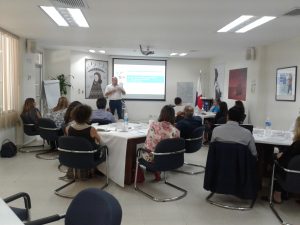The Office of the Ombudsman is delighted to introduce its training curriculum which includes some new additions aiming to help all staff to hone their conflict-management skills.
Our trainings focus extensively on various aspects of communication and are designed to suit the needs of all, in different time frames.
The most popular of our courses is a half-day workshop on ‘Challenging Conversations at Work (and Beyond)’. People often tend to refrain from engaging in difficult conversations, which results in the problems simply growing bigger. This workshop focuses on practical approaches to key aspects of communication and fundamental human concerns, giving you an opportunity to learn powerful ways of turning challenging conversations into productive ones, be it professional or personal.
Additionally, Our workshop, “Intercultural Interactions” explores six dimensions of National culture, and considers how we can use these dimensions to better understand and communicate with our colleagues in our multicultural workplaces.
A recent addition to our curriculum includes a one-day programme on ‘Civility and Respect at Work’ which provides an introduction to the ‘Non-Violent Communication” model and explores aspects of social and emotional intelligence. You will learn how to practice compassion and empathy in emotionally charged conversations to become more effective in conflict prevention and resolution.
Another one-day programme, ‘Mediation: The Right Choice at the Right Time’ has been designed to provide concrete examples of: the mediation process and how it works, how to prepare for mediation, and what to expect throughout the process. It will also help you to understand better your role as a party to mediation.
 In addition, we have introduced a two-day conflict management training which is divided into four half-day sessions that can be taken either consecutively or at different times. It focuses on learning different mechanisms of conflict resolution and their application in a workplace context. One of the key objectives of the training is to help the staff in developing basic mediation competencies, and we highly recommended this training to those in a supervisory role.
In addition, we have introduced a two-day conflict management training which is divided into four half-day sessions that can be taken either consecutively or at different times. It focuses on learning different mechanisms of conflict resolution and their application in a workplace context. One of the key objectives of the training is to help the staff in developing basic mediation competencies, and we highly recommended this training to those in a supervisory role.
We also have a one day training on Negotiation – Key Concepts and Techniques .
Finally, we have five e-learning courses.
- Managing Conflict Effectively in the UN Workplace. Innovative and unique (available also in French and Spanish) it explains in an interactive way how we all can prevent and manage conflicts more effectively, and which resources staff and management can access in addition to those of the Office of the Ombudsman.
- Challenging Conversations at Work (and Beyond). The course is composed of two modules. The first is “Mental Processes that Influence Communication”. Using communication models, this module explains existing obstacles for colleagues to understand one another- and how that impacts our professional work environments. With these frameworks in mind, in the second module, “Practical Communication Techniques” we go into detail on how to transform otherwise challenging conversations into learning conversations through listening, inquiry and speaking.
- Mediation as an Effective Way of Resolving Disputes. The Mediation Unit has developed an e-learning course to help you understand, specifically, the role of mediation and appreciate its effectiveness in resolving workplace conflicts. This course will also ensure that you have a better understanding of how mediation can help not only to reconcile differences between colleagues, but also to foster a more harmonious workplace.
- Managing Emotions at Work: Fundamental Concerns. This course too is composed of two modules and it has been designed to help you better understand, and better manage, the powerful ever-present role that emotions play in communication and conflict. The first module is “The Role of Emotions in a Harmonious Workplace” and it deals with the obligation, especially of managers, to ensure that emotions at work are well managed. The second module, “Building Awareness and Skills” gives practical advice on how to achieve this by building awareness and skills.
- Psychological safety is the belief that allows team members to take risks such as admitting mistakes, sharing ideas or respectfully disagreeing with each other without feeling that doing so will have negative impacts for them. Psychological safety has been widely identified as a key component of highly productive teams and particularly important for stimulating learning behavior in organizations. This course will introduce the concept of Psychological Safety in Teams, its benefits and how it is measured. We will also review why teams in the same organization or department may experience different levels of psychological safety and what can be done to improve it. The course is composed of two modules: Module 1: Psychological Safety, Module 2: Building Skills






